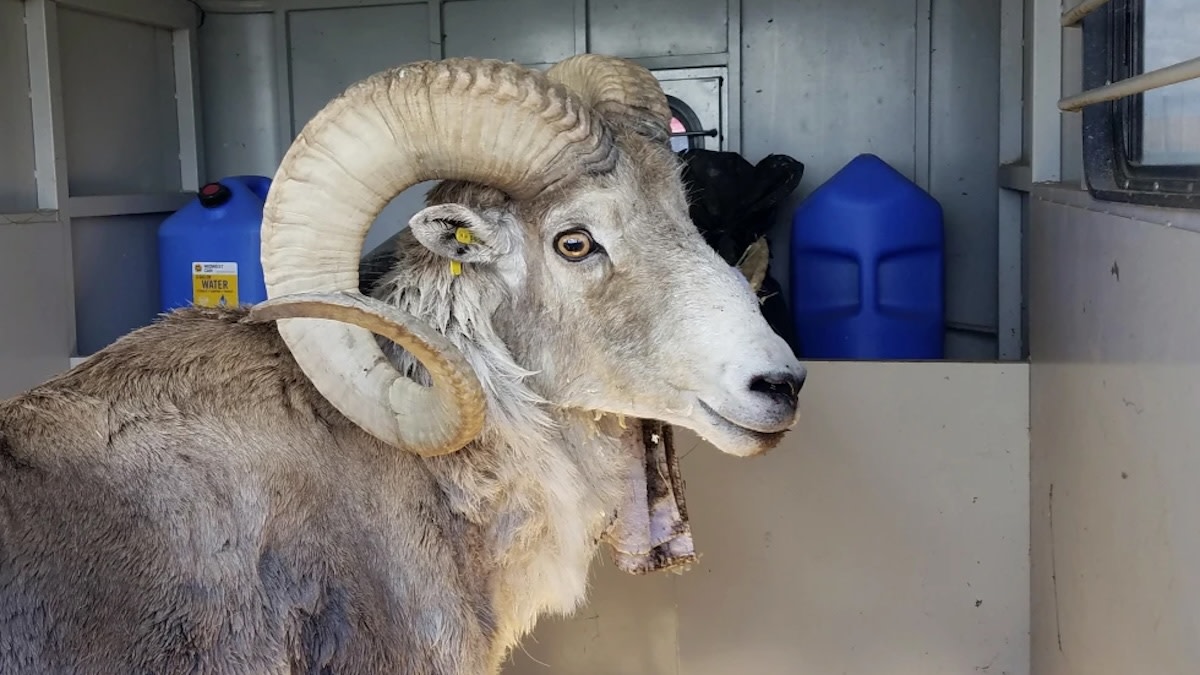
A Montana man pleaded guilty last week to wildlife crimes related to illegally breeding foreign sheep species with the intent of selling them to high-fence hunting ranches. Jack Schubarth, now 80 years old, illegally imported “parts” (presumably testicles) of a Marco Polo argali sheep from Kyrgyzstan into the United States without declaration.
He then sent genetic material to a lab that created cloned embryos, which Schubarth implanted into ewes on his ranch nestled at the base of the Rocky Mountain Front. One fetus proved viable, resulting in a genetically pure Marco Polo male that Schubarth named “Montana Mountain King.”
A Department of Justice press release claims that Schubarth’s ultimate goal was to breed Mountain King with other sheep subspecies and to sell his offspring and sperm to private hunting ranches. “This was an audacious scheme to create massive hybrid sheep species to be sold and hunted as trophies,” Assistant Attorney General Todd Kim said. “In pursuit of this scheme, Schubarth violated international law and the Lacey Act, both of which protect the viability and health of native populations of animals.”
Those who had interacted with Schubarth, however, paint a different picture of the operation. Jim Lane first came across Schubarth’s name when his nephew pulled a coveted bighorn tag in South Dakota. From a conversation in passing, Lane was able to paint a rough image of Schubarth’s operation (and makes clear that other than the conversation, he had no involvement).
According to Lane, Schubarth was acquiring testicles from hunter-killed rams, then extracting semen and breeding bighorns. “He made it clear that he had done this successfully and that he was only interested in really exceptional rams,” Lane said. The appeal of the operation to ram hunters was to keep the trophy genetics alive after the animals had perished.
Montana law prohibits the sale of game animal parts within the state and prohibits the use of Montana game animals on alternative livestock ranches, which is the kind Schubarth owned.
“He seemed like a really nice guy,” Lane recalls. “Real approachable; real open; happy to talk about what he was doing. There wasn’t any real big money in this.”
Maintaining captive sheep requires a lot of money—namely in the construction and maintenance of double fence lines to prevent both escape and contact with other domestic animals. On top of that there’s labor, feed, and transportation, not to mention the lab costs associated with the cloning Schubarth was engaging in. According to the New York Times, Scheubarth in 2020, sold 11 offspring of Mountain King to a ranch in Texas for $13,200, which breaks down to $1,200 per animal.
Schubarth had also previously been in the captive whitetail business. In 2000, Montana passed a bill prohibiting new game farms; however, according to the Wildlife Farm Database, Schubarth still owns Sun River Whitetails—the last captive deer-breeding outfit in Montana. When Schubarth started his sheep-breeding operation, however, is unclear.
Schubarth never mentioned anything about the Marco Polo cloning to Lane. “He did not, at any time [around 2019], say anything to me about that. That might’ve been an indication that he was up to something he shouldn’t have been—I don’t know…this guy wasn’t hiding anything. If he was, he was doing it in plain sight.”
The Justice Department, however, claims otherwise. According to the press release, “Schubarth and others forged veterinary inspection certificates, falsely claiming that the sheep were legally permitted species. On occasion, Schubarth sold Montana Mountain King semen directly to sheep breeders in other states.”
To Lane, the unsettling thing about the whole situation is how easily hunters could’ve inadvertently been dragged into Schubarth’s scheme. If Schubarth was offering to pay for shipping or a small fee for sheep testicles (although the exact logistics of how it would’ve happened are entirely speculative), hunters could’ve easily and unknowingly been involved with the hybridization of illegal sheep species–not to mention the sale of game parts.
It is also unclear which lab was involved with the cloning. Whatever lab it was must have known they were cloning Marco Polo sheep. The DOJ press release says Schubarth conspired with at least five other individuals but does not name them. The trade and captive breeding of the species is illegal internationally thanks to the Convention on International Trade in Endangered Species, and in the United States under the Lacey Act.
Wildlife officials are toting the bust as an important conservation measure to protect wild sheep populations in Montana and beyond. “The kind of crime we uncovered here could threaten the integrity of our wildlife species in Montana,” says Ron Howell, Chief of Enforcement for Montana Fish, Wildlife & Parks “This was a complex case and the partnership between us and U.S Fish and Wildlife Service was critical in solving it.”
As a result, Schubarth faces two felony crimes: conspiracy to violate the Lacey Act, and substantively violating the Lacey Act. Each count is punishable by up to five years in prison and $250,000. Schubarth is scheduled for sentencing on June 11th.
Feature image of "Mountain King" via Montana Fish Wildlife and Parks via AP.





